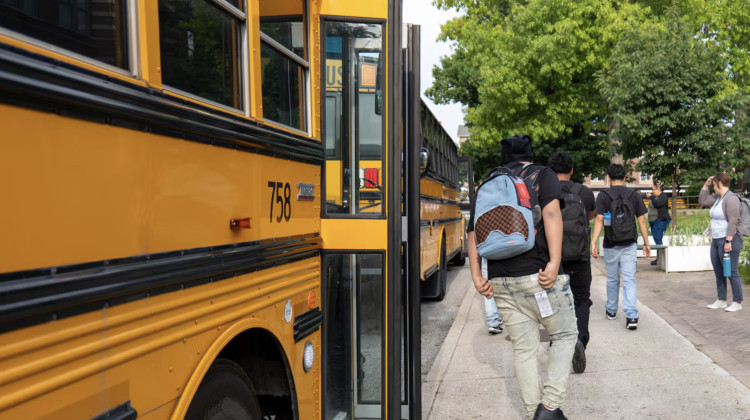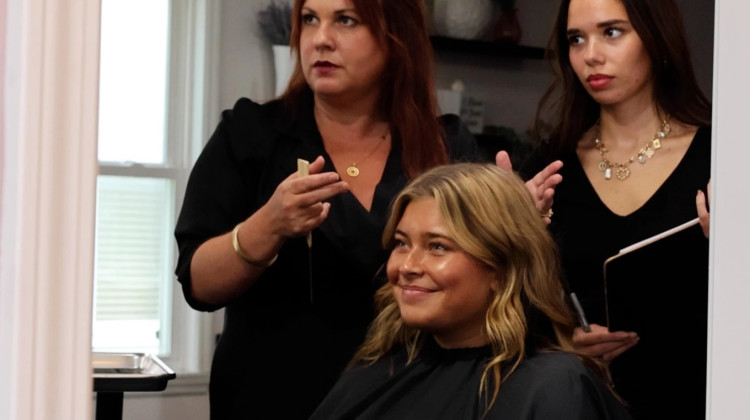
West Lafayette community members wonder if new Purdue University leadership offers an opportunity for change.
Ben Thorp/WBAA NewsWith the “Daniels Decade” at a close, some within the West Lafayette community are hopeful they can build a different kind of relationship with Purdue University through its new president, Mung Chiang.
That’s how West Lafayette City Councilmember James Blanco framed discussions he hoped to have with the new president during January’s city council meeting.
During that meeting, the city was presented with a rental housing report which found a zero percent vacancy rate across much of the downtown areas of West Lafayette and Lafayette. The report underlined that the lack of housing was largely being driven by the growth of Purdue’s student body: going from 39,726 in 2010 to 49,639 in 2021.
In 2022, the estimated student population was at 50,884 - which the report underlined would “present supply challenges for both on and off-campus housing providers.”
And, according to the rental report, “no new, on-campus, residential projects are currently in the construction pipeline.”
That report led Blanco to describe Purdue’s admissions growth as “unsustainable.”
Blanco is expected to introduce a resolution next month calling on Purdue to consider housing supply when making admissions decisions. It will also encourage the university to work alongside the city to address the housing shortage.
“We need to make sure that when Purdue says they are going to keep on raising admissions, we’re going to be in consultation with them if they are going to keep on doing that,” he said. “We need more places for students to live.”
Blanco said it’s also a good way to evaluate the city’s partnership with the new school president.
“It’s a good time to see where we are and see if we can make it a closer, more collaborative relationship,” he said.
Blanco said that reassessment is important now because the council hasn’t always had a good relationship with Purdue when it comes to housing and admissions. He points to projects like the Verve, a high-density apartment complex approved by the council in June of last year, as evidence of a strained relationship between Purdue and West Lafayette.
“We’ve had a number of developments where – if you ask the members of the council – maybe we had some kind of misgivings, or maybe even reservations about them, but we would vote in favor of them because we kind of felt forced,” he said. “We need more housing – we felt forced at some level to support such development.”
When the council approved the Verve development, council president Peter Bunder voted against the project. He argued that the city should “provoke” a conversation with Purdue about its admission plans – and whether there would be any limit.
“Are they going to build dorms? They say they are,” he said. “Where are they going to build them, and how many people would be in those?”
Not everyone feels that the Purdue relationship needs to be reevaluated, however.
West Lafayette Mayor John Dennis said he appreciates the spirit of Blanco’s resolution, but worries about the message it sends to Purdue.
“To craft legislation that says ‘thou shall’ would be a little bit out of our league,” he said. “We probably need to be cautious and make cautious steps towards that.”
And, Dennis said, Blanco’s characterization of West Lafayette’s relationship with Purdue as anything but collaborative “is wrong.”
“The relationship with President Daniels and Purdue is probably the most mutually beneficial relationship this city has ever had,” he said. “We live and die by our tax base.”
But Dennis isn’t opposed to having a conversation with Purdue to address the housing needs in the city driven by student enrollment.
“To have some sort of collaborative relationship with Purdue to ease the cost of housing – that’s worthy of consideration,” he said.
Graduate workers see opportunity for better wages
West Lafayette city officials aren’t the only ones eyeing the potential for an improved relationship after a change in leadership.
Graduate workers at Purdue have been advocating for a living wage at the university – arguing a recent stipend increase still fell below that threshold.
In 2022, Purdue announced a $15 an hour minimum wage for full-time hourly workers and a stipend increase for graduate workers, which put the minimum at roughly $24,000 per year. At the time, some graduate students argued those increases still fell below the area living wage of roughly $31,000 (the living wage in the region is currently estimated to be over $32,000 annually).
Olivia Gearner, a PhD student and member of the Greater Lafayette Democratic Socialists, said graduate workers were undervalued under former Purdue president Mitch Daniels.
“The previous administration really had an austerity policy of cutting the budget, not raising tuition,” she said. “That was Mitch Daniels’ way of leadership at the university, and that included continuing to undervalue the workers.”
In a letter to students, faculty, and staff at the start of the semester, Purdue’s new president Mung Chiang described graduate workers as the “engine that powers Purdue’s research and teaching missions.”
Gearner said she’s hopeful that could mean Chiang is more open to paying graduate workers a living wage.
“I would agree with the president that graduate student workers and undergraduate student workers are some of the people who really run the university, especially graduate students who teach a lot of the classes and do a lot of research,” Gearner said. “If the new administration is serious about valuing its workers, the way that they can demonstrate that is by paying them a dignified living wage.”
But looking at Chiang’s statements, Gearner said she is concerned that there isn’t a mention of other kinds of workers at the university.
“There are many other workers who are also responsible for making sure the university runs who are also paid a sub-living wage,” she said. “This includes custodians, groundskeepers, and dining staff.”
When asked to comment on graduate student wages and the pending resolution from West Lafayette, a spokesperson for Purdue declined to comment directly on either matter.
“Only week two for Mung and these are complex issues,” Purdue spokesperson Tim Doty wrote in an email.
Regardless of how Chiang decides to respond, the president is in the process of holding town hall meetings with undergraduate students, graduate students, and faculty and staff.
A town hall meeting with graduate students is set for Jan. 26.
Contact WBAA/WFYI reporter Benjamin Thorp at bthorp@wfyi.org. Follow on Twitter: @sad_radio_lad.
 DONATE
DONATE








 Support WFYI. We can't do it without you.
Support WFYI. We can't do it without you.